I love Jesus’ parables, especially the ones about planting and growing. Every time I garden it becomes an opportunity to reflect on my faith and the nature of our relationship with God. I feel at home in the soil. My passion for God and God’s people has become integrated with my passion and love for God’s creation. But where did this all begin?
I don’t think it is an accident I ended up where I am.
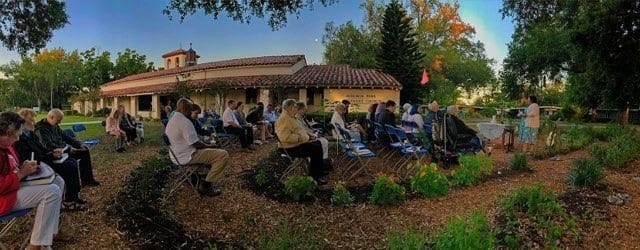
Growing up in the 80s, a decade of consumption and convenience, from the outside our family lived what to most would seem like a typical Midwestern suburban American lifestyle. In fact, I thought of it as pretty normal because I didn’t know any different. But upon reflection I find it to be fairly unique.
I fondly call my parents “Christian hippies” though they were really too young to be a part of the hippie movement of the ‘60s, coming of age instead in the mid ‘70s. But their thoughtful Christian faiths meant we lived a little differently:
- We always grew some of our food, and while they took great pride in caring for the house and property, there were certain things we did and didn’t do. We didn't use pesticides or fertilizers on our lawn. In fact, the term “lawn” is being generous, as it was mostly regularly mowed weeds.
- We used old towels as rags instead of paper towels, something it turns out most people don't do. We took our own bags to the grocery store, and there was even a phase where my mom was making her own yogurt.
- We composted & recycled, waaaay before these were cool things to do, and long before curbside recycling existed. In fact very early in my life it became my job to take the compost out back & sort the recycling in the garage.
- My mother was vegetarian when my parents got together, and while I wasn’t raised that way, we mostly ate fairly simply & homemade. One of our favorite cookbooks growing up was the “More with Less” cookbook, commissioned by the Mennonite Central Committee in 1976 with the goal of "helping Christians respond in a caring-sharing way in a world with limited food resources" and "to challenge North Americans to consume less so others could eat enough."
- Raised ELCA Lutheran, in our household, church, and the school attached (which I attended from nursery school to 8th grade), science & faith were not in opposition to each other. In fact they were important compliments to one another- each helping make sense of the other one.
- My father was an Environmental Science major in college and my mother was a Religious Studies major. This was my upbringing—it perhaps tells you all you need to know! I am a product of my childhood in many ways.
I graduated from high school thinking I was going to be an environmental lawyer but ended up much more people-focused in teaching and ministry. It was while studying at North Park Theological Seminary in Chicago that God put all the puzzle pieces which are me together, where my passion for the created world was re-integrated into my passion for ministry and God’s people.
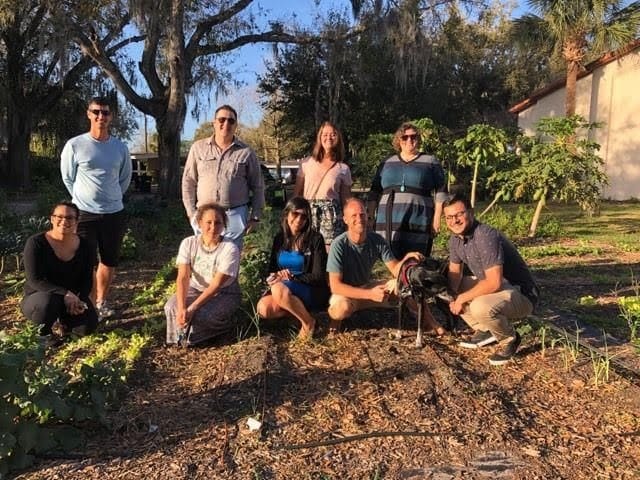
I distinctly remember the moment in my 1st year New Testament Class where Dr. Klyne Snodgrass was translating on the fly out of a Greek New Testament a passage from Colossians 1:15-20, and all of a sudden I heard it in a way I never had before: God in Jesus is reconciling all of creation to God’s-self. I actually interrupted him and said, “ALL things, all of creation? ”For some reason this struck me in a way it never had before. So much focus and emphasis in church has always been about saving & reconciling people that I had missed it somewhere along the way. ALL THINGS redeemed! With this renewed perspective, passages like Romans 8 also gained a crucial ecological dimension for me.
My last year in seminary I was blessed to take a “Thought & Theology of Wendell Berry” class taught by Dr. Brent Laytham & Dr. Jay Phelan. This two-week intensive class set my imagination of an ecological worldview on fire in the best way possible and was followed up by my final semester with a practical ministry class focused on sustainable urban ministry and development. This last class is where I discovered the principles of Permaculture, which have shaped my continued integration considerably.
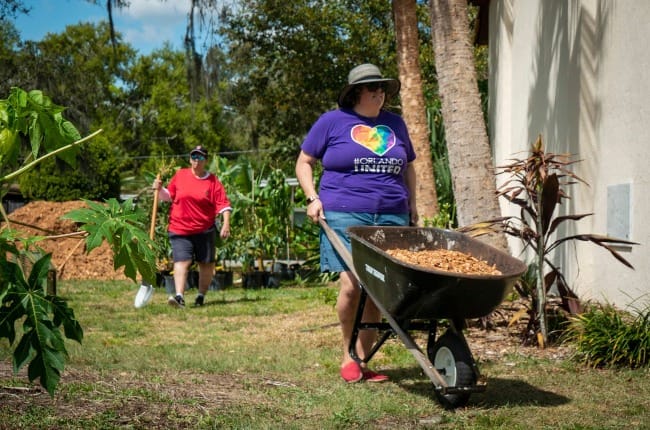
These were the rich nutrients of experiences & education that grew me into an ecological pastor, or as I go by on Instagram: @PastorFarmerSarah
God then planted me in the nourishing soil of an amazing community here in Central Florida, particularly Audubon Park, where there was already a clear predisposition for focusing on sustainability, and where a person can produce and grow amazing foods and flowers year-around.
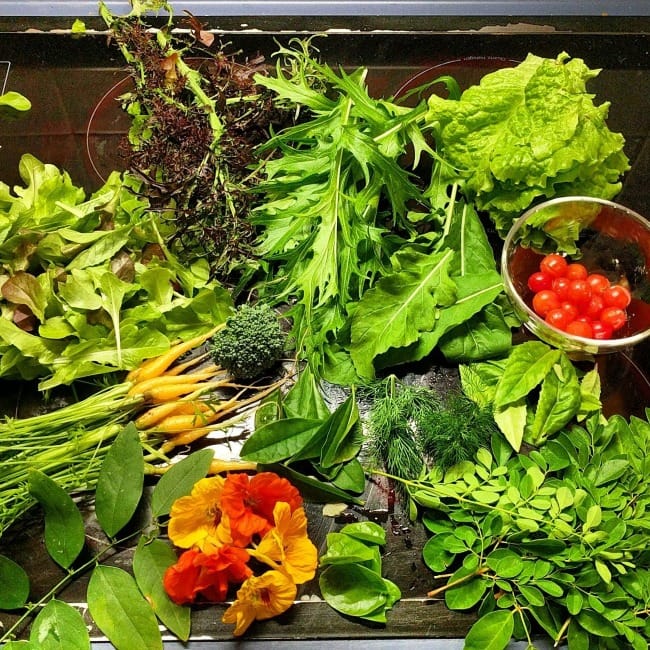
Over the last few years, I have been able to move from abstract learner to true learner-practitioner. Developing partnerships with local organizations like Ideas for Us, Fleet Farming & Orlando Permaculture has allowed our church to become the heart & epicenter of the sustainability movement in Orlando, so much so that world-famous eco-activist Rob Greenfield chose our community as the location for his latest ambitious project: for one year to eat only what he could grow and forage. In that time, my yard became his demonstration classroom, and the church now has a food forest of over 30 fruit trees, besides a farmlette and pollinator garden. What’s more, my vision of our church becoming a leader in the movement toward ecological faith communities is being fulfilled as Rob produced this fantastic video about us.
My learning continues to unfold as I read books like Braiding Sweetgrass by Robin Wall Kimmerer, Shalom & the Community of Creation: An Indigenous Vision by Randy Woodley and Al Tizon’s book Whole & Reconciled. As I see it now, our calling as Christians cannot be separated from the call to care for the earth. These are integrated callings, in fact, they are one and the same.
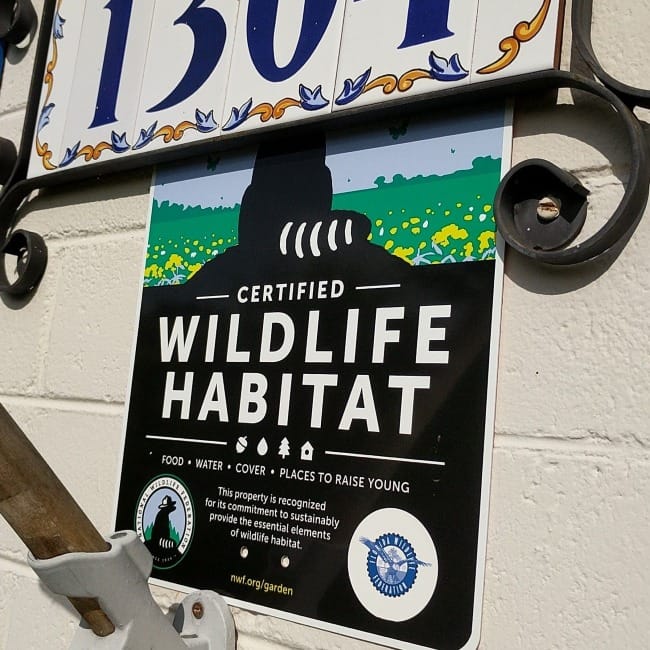
The Christian church can no longer see Creation Care as some sort of Justice Ministry silo of the larger church. It instead needs to be an integral part of all aspects of mission, ministry, and discipleship as well as the crucially practical aspects of church life: worship, fellowship, and property use. This is what the church needs to stay vital. This is what our world needs from the church. Partnering with the Holy Spirit, we must be about Kingdom of God business, healing and reconciling all of creation (of which we are just one part) until the heavenly Kingdom is fully present on Earth.
Pastor Sarah